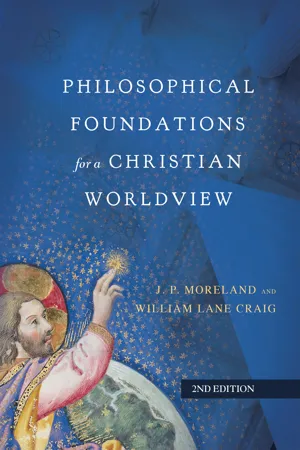
- 708 pages
- English
- ePUB (mobile friendly)
- Available on iOS & Android
Philosophical Foundations for a Christian Worldview
About this book
ECPA Gold Medallion Award
Chicago Book Clinic Award of Excellence
What is real? What is truth? What can we know? What should we believe? What should we do and why? Is there a God? Can we know him? Do Christian doctrines make sense? Can we believe in God in the face of evil?
These are fundamental questions that philosophy answers. And the answers we give to these kinds of questions serve as the foundation for constructing our worldview.
In this updated and expanded second edition, Philosophical Foundations for a Christian Worldview by J. P. Moreland and William Lane Craig offers a comprehensive introduction to philosophy from a Christian perspective. With characteristic clarity and incisiveness, Moreland and Craig outline clear arguments and present rival theories with fairness and accuracy. They introduce readers to the principal subdisciplines of philosophy including epistemology, metaphysics, philosophy of science, ethics, and philosophy of religion.
In this book, Moreland and Craig show how philosophy
- aids Christians in the tasks of apologetics, polemics, and systematic theology;
- reflects that we are made in the image of God;
- helps us to extend biblical teaching into areas not expressly addressed in Scripture;
- facilitates the spiritual discipline of study;
- enhances the boldness and self-image of the Christian community; and
- is requisite to the essential task of integrating faith and learning.
This textbook is a lively and thorough introduction to philosophy for all who want to understand reality. This second edition includes enhanced arguments, updated bibliographies, and new chapters on atonement and the mind-body problem. With Philosophical Foundations for a Christian Worldview, get a clear and comprehensive guide for understanding philosophy from a Christian worldview.
Frequently asked questions
- Essential is ideal for learners and professionals who enjoy exploring a wide range of subjects. Access the Essential Library with 800,000+ trusted titles and best-sellers across business, personal growth, and the humanities. Includes unlimited reading time and Standard Read Aloud voice.
- Complete: Perfect for advanced learners and researchers needing full, unrestricted access. Unlock 1.4M+ books across hundreds of subjects, including academic and specialized titles. The Complete Plan also includes advanced features like Premium Read Aloud and Research Assistant.
Please note we cannot support devices running on iOS 13 and Android 7 or earlier. Learn more about using the app.
Information
Part I
Introduction
1
What Is Philosophy?
From what causes do I derive my existence,
and to what condition shall I return?
Whose favor shall I court, and whose anger must I dread?
What beings surround me?
And on whom have I any influence, or who have any influence on me?
I am confounded with all these questions,
and begin to fancy myself in the most deplorable condition imaginable,
inviron’d with the deepest darkness,
and utterly deprived of the use of every member and faculty.
but only one which might puzzle one of those who need argument.
First, a good understanding, a clear apprehension, a sound judgment,
and a capacity of reasoning with some closeness? . . .
Is not some acquaintance with what has been termed the second part of logic,
(metaphysics), if not so necessary as [logic itself], yet highly expedient?
Should not a Minister be acquainted with at least the
general grounds of natural philosophy?
1—Introduction
2—The Nature of Philosophy
Table of contents
- Contents
- Outline of the Book
- Preface
- An Invitation to Christian Philosophy
- Part I: Introduction
- Part II: Epistemology
- Part III: Metaphysics
- Part IV: Philosophy of Science
- Part V: Ethics
- Part VI: Philosophy of Religion and Philosophical Theology
- Suggestions for Further Reading
- Notes
- Name Index
- Scripture Index
- Praise for Philosophical Foundations
- About the Authors
- More Titles from InterVarsity Press
- Copyright